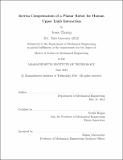Inertia compensation of a planar robot for human upper limb interaction
Author(s)
Thorup, Jessie
DownloadFull printable version (8.579Mb)
Other Contributors
Massachusetts Institute of Technology. Department of Mechanical Engineering.
Advisor
Neville Hogan.
Terms of use
Metadata
Show full item recordAbstract
This thesis documents the development of software and a control system for the InMotion2 planar robot. Software was developed to provide sensor input processing from the robot encoders and force/torque transducer, and output processing for the robot motors. A controller scheme was developed to compensate for the natural robot configuration-based inertia as well as friction and un-modeled dynamics. The inertia compensator was designed using an inertial admittance model and a nonlinear robust adaptive tracking controller based on sliding mode control. A hybrid control mode was developed in which impedance control was used to enforce a virtual constraint and inertia compensation acted along the constraint. The controller proved to be stable throughout testing and provide the desired inertia. The accuracy of the inertia compensation was within human perception limits for modest inertia references.
Description
Thesis: S.M., Massachusetts Institute of Technology, Department of Mechanical Engineering, 2018. This electronic version was submitted by the student author. The certified thesis is available in the Institute Archives and Special Collections. Cataloged from student-submitted PDF version of thesis. Includes bibliographical references (pages 139-142).
Date issued
2018Department
Massachusetts Institute of Technology. Department of Mechanical EngineeringPublisher
Massachusetts Institute of Technology
Keywords
Mechanical Engineering.